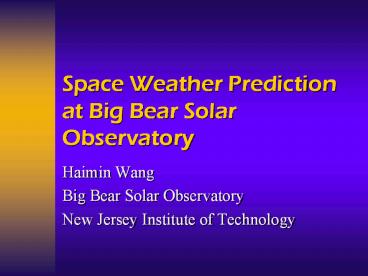Space Weather Prediction at Big Bear Solar Observatory - PowerPoint PPT Presentation
1 / 35
Title:
Space Weather Prediction at Big Bear Solar Observatory
Description:
Big Bear Solar Observatory. 3. BBSO White Light Image of Sun 8/20/1999. Sun's Temperature: ... Big Bear Solar Observatory. 7. 6/25/09. Big Bear Solar ... – PowerPoint PPT presentation
Number of Views:28
Avg rating:3.0/5.0
Title: Space Weather Prediction at Big Bear Solar Observatory
1
Space Weather Prediction at Big Bear Solar
Observatory
- Haimin Wang
- Big Bear Solar Observatory
- New Jersey Institute of Technology
2
http//www.bbso.njit.edu/
3
2 27 Meter Dishes in the Owens Valley Solar Array
(OVSA)
- Unique in the World
- Array Includes
- 3 (soon to be 5) 2
- meter dishes
- Frequency Agile
- Multiple Baselines
4
BBSO White Light Image of Sun 8/20/1999
- Suns Temperature
- Center 15,000,000 K
- Surface 4,000 K
- Corona 5,000,000 K
- Energy Source
- Nuclear Fusion
- Energy Transport
- Radiative to 0.7 R
- Convective 0.7-1.0 R
Sunspots
5
Other Observing Tools
- Global Halpha Network (1 min. cadence, 2K by 2K
cameras) - BBSO
- Kanzalhohe Solar Observatory
- Yunnan Observatory
- Huairou Solar Observatory
- Vector Magnetograph Network
- BBSO
- Huairou Solar Observatory
- Crimean Astronomical Observatory
6
High Resolution Observations
7
BBSO Vector Magnetogram December 13, 2000I, V,
Q and U
8
(No Transcript)
9
BBSO Ha Image of the Sun
- Image from 8/20/1999 same day as the white
light image - Filaments and Prominences are cold, dark
magnetized material held in magnetic basket above
the Suns visible surface suspended in the
corona - Prominence bright against dark backdrop
- Ha sensitive to T10,000 K the chromosphere
Prominence
Filaments
10
Sun in UV (304 Å) SOHO/EIT
- 8/20/1999
- Satellite data used in concert with BBSO to
understand Sun - Still see filaments and prominences at T80,000 K
- See Coronal holes
- See Brightness at Limb
Prominence
Filaments
Coronal Hole
11
Sun in EUV (284 Å) SOHO/EIT
- 8/20/1999
- See prominences and filaments dark against the
now bright corona - Temperature sensitivity near 1,500,000 K
- Filaments and prominences fading as corona
brightens
Prominence
Filaments
12
Sun in X-Ray (YOHKOH)
- 8/19/1999
- Prominences and filaments now gone, but corona is
very bright - Temperature sensitivity about 4,000,000 K
- Higher temperature means sampling higher in the
solar atmosphere
13
Suns Magnetic Field -- KPNO
- 8/20/1999
- Magnetogram with bright and dark regions being
opposite polarities of the line-of-sight magnetic
field - Filaments/Prominences along the neutral line
between opposing polarities
14
Sunspot Number
- Sunspot number 1620 1996
15
The Sun in X-Ray Light
Solar Activity Minimum --1996
Solar Activity Maximum--2000
16
Prominence Eruption in Ha BBSO
- 4/15/2001
- Prominence eruption
- Coronal Mass Ejection (CME) may accompany some
filament/prominence eruptions - Earth-directed CMEs can have geomagnetic effects
17
April 15, 2001 Prominence Eruption
18
Space Weather Effects
19
Real Time Reports and Forecasting
www.bbso.njit.edu
- BBSO Activity Report
- BBSO Activity Warnings
- Automated Filament Disappearances Detections
- Active Region Monitor
20
Filament Eruptions, Flares, CMEs and
Interplanetary Magnetic Clouds
- Association of Filament Eruptions with CMEs
- Surface Magnetic Structure and that of Magnetic
Clouds - Topology of Magnetic Fields and Eruptive Events
- Loop Interaction
- Eruption of Twisted Loops
21
Relationship Between Filament Eruptions and CMEs
22
Surface Magnetic Field Structure and Toplology of
Interplanetary Magnetic Clouds (IMC)
- Use Vector magnetograms, Halpha, TRACE, Yohkoh
and SOHO data to constructure surface magnetic
field structure - Use ACE/Wind Magnetometer data to derive topology
of IMC - If the relationship can be established, 2 day
advanced warning can be provided for the
prediction of South-Orientated IMC
23
Case Studies
- Yurchyshyn et al., 2001, Ap.J., sunmitted
- 2/17/2000 event
- 7/14/2000 event
24
Sympathetic Flares
25
LASCO C3 Movie, 2/17/2000
26
LFFF Extrapolation, 2/17/2000
27
ACE Data, 2/17/2000
28
Halpha, 07/14/2000
29
LFFF Extrapolation, 7/14/2000
30
LASCO C2, 7/14/2000
31
ACE Data, 7/14/2000
32
Cartoon to Demonstrate two Events (top,
2/17/2000, bottom, 7/14/2000)
33
MDI Movie (11/23 to 11/25, 2000)
34
Halpha Movie, 11/24/2000 Flare
35
Summary
- Unique High Quality Data
- Well Established Data Analysis Tools
- Established Real-Time Monitoring of Solar Acticity































